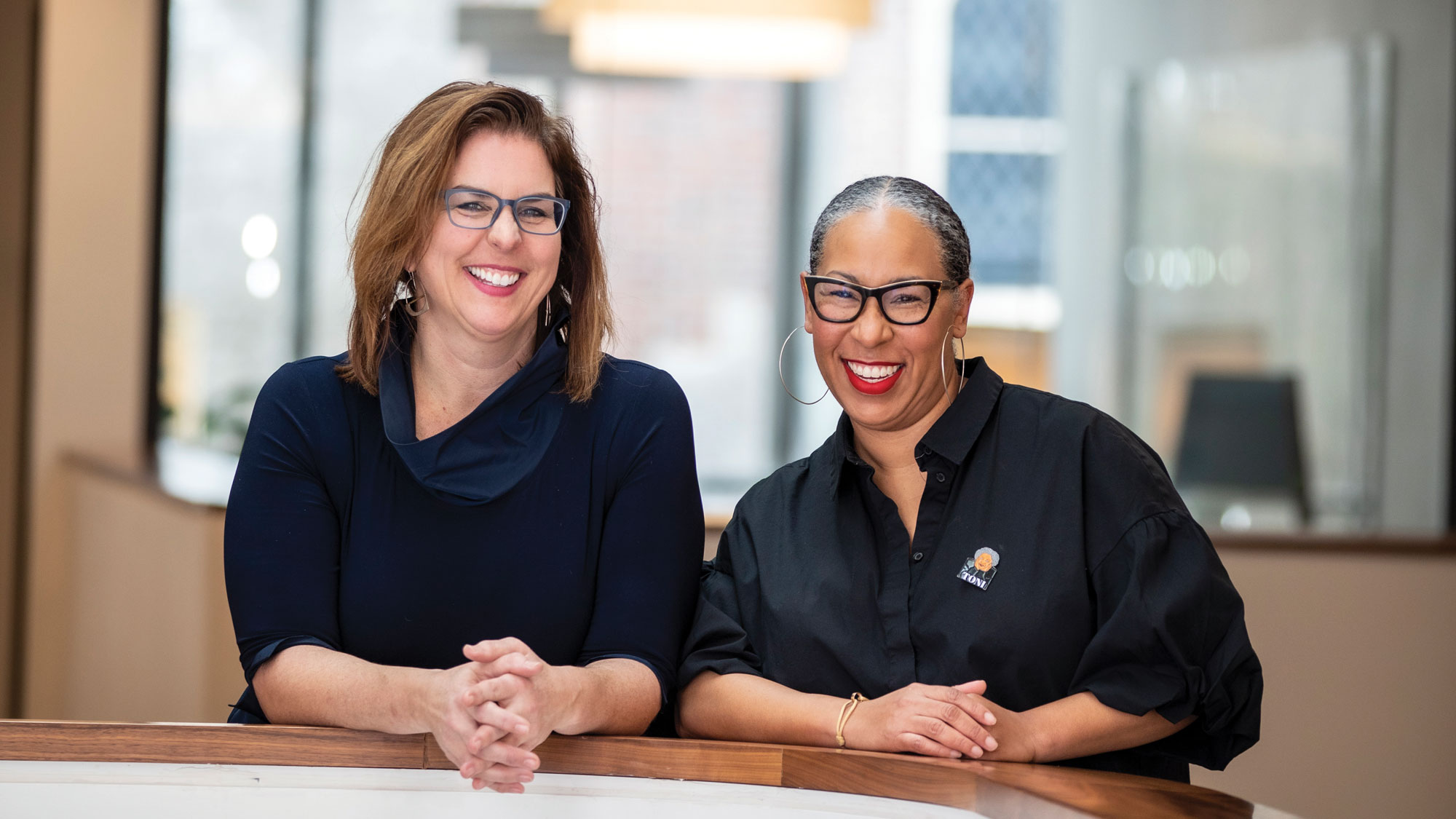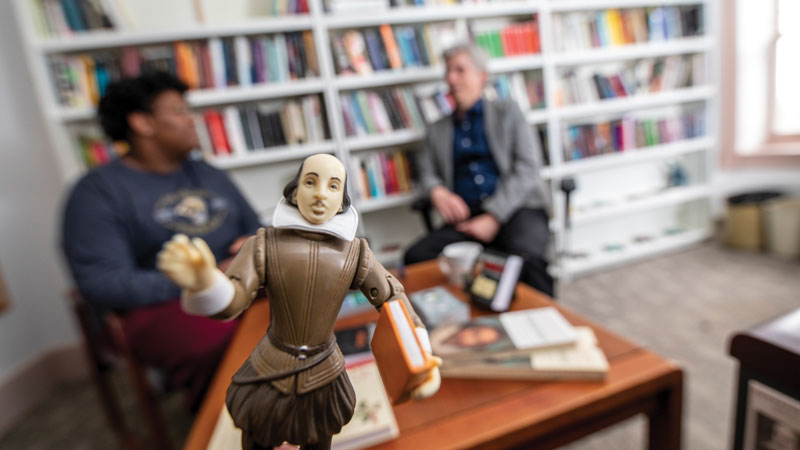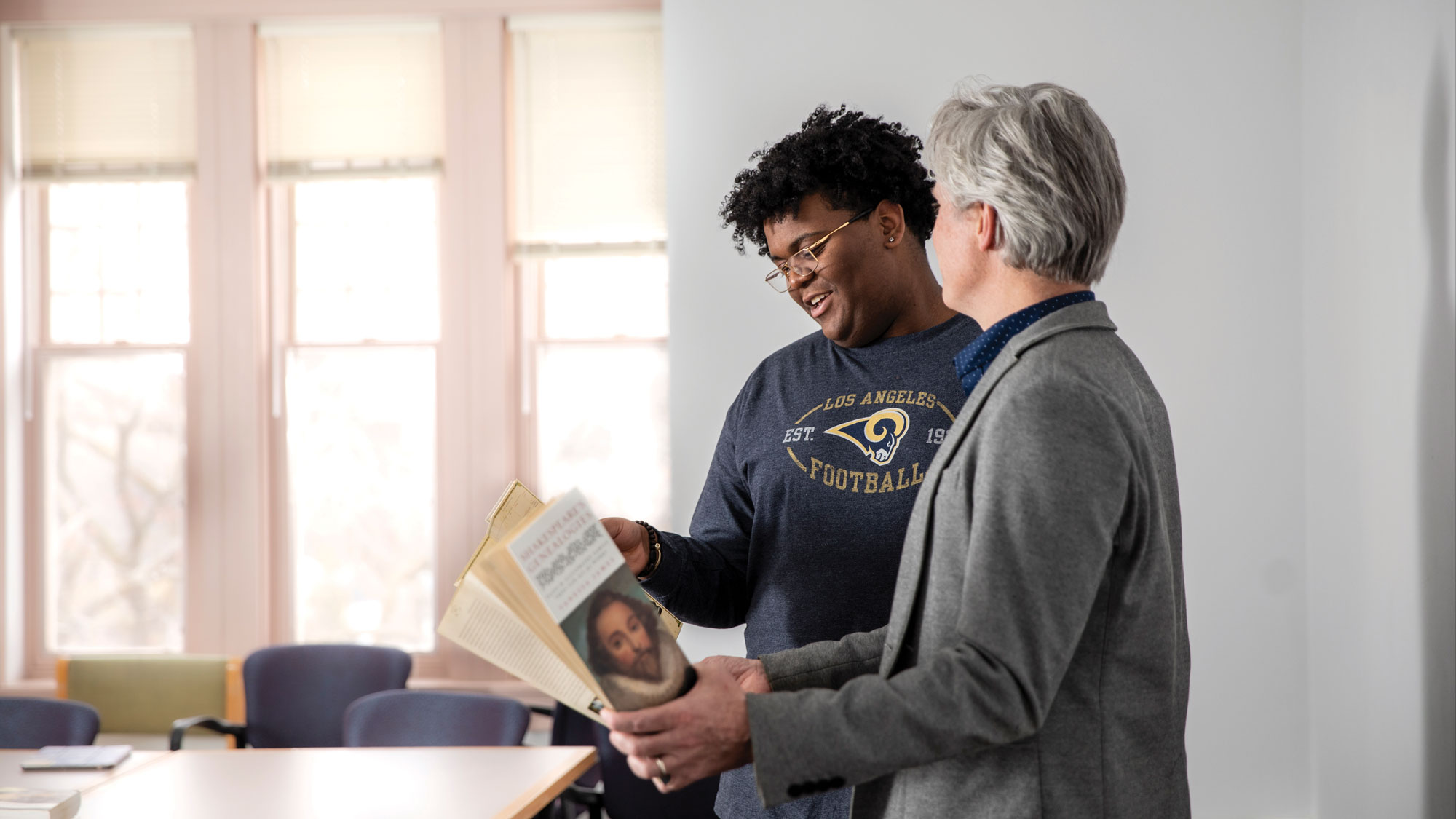When the Mentor Becomes the Student
“Serving as a Mellon Mays mentor is not just about what you give the students,” says Valérie Benoist, professor of Spanish and Latin American studies. “What they give back to you is just as important.”
Most professors understand this sentiment. The passion that students can bring to classes, their interest in learning, engagement with the subject matter, and the drive they have to explore can inspire and motivate even the most overworked professor.
In the Mellon Mays Undergraduate Fellowship Program, faculty mentors find this effect even more pronounced. Mentorship requires faculty members to work one-on-one with students over two years at Grinnell, guiding them in long-term research, developing as a scholar, and preparing for graduate school and professional life. It’s a major commitment on the part of faculty members already carrying full course loads, office hours, and the other day-to-day tasks associated with their work. But it comes with major rewards.
“Working with my fellow, Ifetayo Olutosin ’18, for two years was a very rewarding experience as I got to watch her grow intellectually and truly become a scholar,” says Benoist. “We met weekly and Skyped when she was not on campus. I helped her sharpen her research skills, worked with her as she crafted her research questions and wrote and rewrote her argument, and assisted her with her presentation for conferences and applications to grad school and her submission of an article for publication. She is now in her second year of graduate school at the University of Southern California, where she is completing a Ph.D. program in Latin American Studies, but our relationship did not stop with her graduating. It has grown into a relationship of scholars and will become one of colleagues.”

Karla Erickson (left) and Shanna Benjamin
Karla Erickson, professor of sociology, became involved with the Mellon Mays Fellowship program in 2009, its inaugural year at Grinnell. She now serves as the second director of the program, taking over from Shanna Benjamin, associate professor of English, a former Mellon Mays fellow herself who initiated the effort and led the program for a decade at Grinnell.
“We stay connected with our fellows for 10 to 20 years, for much longer than they are here,” says Erickson. “It’s wonderful to get them to graduation. When you hang the medal on them at Commencement, you really feel that. But when they get through graduate school and don’t just survive but thrive, it’s great to see. And it’s great for a program this young to have that kind of success.”
Shared Benefit
The Mellon program has demonstrated success, both at Grinnell and nationally, at producing scholars who enter the academic world and increase the diversity of faculty at the collegiate level, then continue to push the program forward.
Nationally, the program has produced more than 700 tenured fellows since it began in 1980. At Grinnell the program has already produced 55 fellows who’ve gone on to graduate school and three who’ve earned their doctoral degrees. Additionally, more than a dozen are currently pursuing graduate studies.
The program has gone well beyond that primary objective and created unforeseen positive consequences as well.
“The projects my fellows are working on really help me expand my own knowledge on the subject and how I teach it in the classroom,” says John Garrison, associate professor of English. “It’s really inspiring. They come in with new thoughts and ideas on the subject, and it helps me keep up with new ways of teaching and inspires me to do new things.”

Garrison is mentoring two Mellon fellows, Elijah Griffin ’21 and Saiham Sharif ’20. Both have presented at conferences on their research projects and have traveled to Cape Town, South Africa, to study with other fellows from around the country.
“The program gives them an idea of what graduate work will look like, and it also provides them a community to support them,” says Garrison. “And just as they are getting a glimpse of what graduate school will be like, I am getting a glimpse of what it is like to teach graduate students and guide them on long-term projects, which is unusual at the undergraduate level.”
With 15 years of experience teaching the ins and outs of Shakespeare to undergraduate students, Garrison welcomes the fresh ideas and inspiration he draws from his mentees.
“It really reignites my passion when I see someone else so engaged in the subject,” he says. “It keeps me from getting in a rut, and I can continue to view the subject through a new set of eyes and keep up with not only where the field is currently, but also where it might be in five to 10 years.”
One of his fellows, Elijah Griffin, is conducting research and exploring the notions of blackness in Shakespearean performance as part of his fellowship. He’s looking at adaptations of the plays to see how blackness is approached and performed within Shakespeare and how it can impact the message and meaning of the work.
“This has really helped me rethink how Shakespeare exists in a contemporary sense,” says Garrison. “I want to think about Shakespeare as it exists now, not just in the 17th century — how it is relevant today and how it speaks to contemporary audiences. This helps inform why we still teach Shakespeare and why it is still relevant.”
For Benoist, who is looking forward to taking on more fellows as a mentor, Grinnell is the perfect environment for an experience that fosters growth from both student and mentor.
“The small classes, great students, and the opportunities for interaction with them in and out of class really make Grinnell perfectly suited for a program like this,” she says. “Meeting with your fellow and exploring new ideas makes you think about your own scholarship and pushes you in directions you might not have otherwise pursued. I wish more people could take advantage of it. It’s been an amazing experience, and I really look forward to participating as a mentor again, in addition to continuing the relationship I already have as a mentor with Ifetayo.”
The Mellon Mays Undergraduate Fellowship Program was established in 1988 by the Andrew W. Mellon Foundation to address the shortage of minority scholars on college and university campuses across the country. Funding from the foundation allowed Grinnell to bring the program to campus in 2009 to support promising undergraduates considering graduate study.

